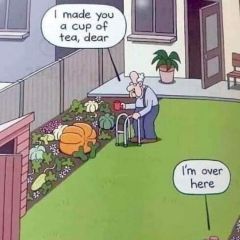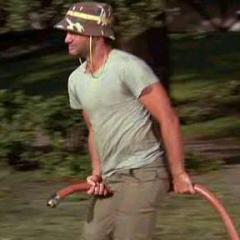The Day Golf Became Easier
Every golfer has the thought at some point..
"If only I could consistently shoot in the 70s, then I would enjoy golf more."
We get lost in our heads, dreaming of a fantasy where golf was one day an easy game.
What if we didn't have to worry about water hazards, sand, or OB?
What if 3-footers didn't bring us anxiety?
What if we could enjoy that pure strike that we long for on every single shot?
I'd argue that the better a golfer gets, the more enjoyable the game is.
But.. not in the way that most golfers imagine.
In this post, I will be examining our love affair with golf, how we can enjoy the failures that the game inevitably brings us, and why golf will never get easier (but can become more enjoyable).
Why Do We Love Golf?
What is fun about slicing a golf ball into the window of a house, or duffing a chip into the bunker?
If you're a bit more experienced, what is fun about making a triple bogey on the last hole to shoot 82?
Even at the highest levels, what is fun about missing a 5 footer to make the cut in a big tournament?
Golf is a game of heartbreak. For every great shot, there are five bad shots. You will fail by most standards 99% of the time. You might spend hours on the driving range, and perform worse the next day. If you hit one shot in the wrong place, your entire round could turn for the worse.
So why?? Someone explain to me why we love this game so much??
From another perspective, it does feel amazing to hit a pitch shot off tight turf, watch it bounce short of the hole, spin, and stop an inch from the cup.
It also feels rather pleasing to hit a low stinger down the middle of the fairway on a tight par 4.
Heck, it even feels great to make that dead straight 3-footer on the last hole to shoot 72!
In reality, our love affair with golf comes from something completely out of our control.
In pyschology, this external force is called "operant conditioning."
More specifically, as we practice golf, our behavior is being reinforced on a "variable-ratio" schedule of reinforcement. In psychological terms, this means that our behavior (hitting another golf ball) is reinforced after an unpredictable amount of responses (you never know when that "pure" strike is going to come). This reinforcement schedule is often noted as producing a high and steady rate of response (why you can't get yourself to stop hitting golf balls).
What you might not realize is that this type of operant conditioning is seen in one of the most addictive activities known to man...
Gambling.
Just like we pull the lever on the slot machine over and over, waiting for the symbols to line up, we also stand on the driving range, hitting ball after ball, waiting for that "pure strike" to happen.
In other words, we are literally addicted to golf.
Fortunately, golf is quite a productive and healthy behavior!
But like all addictions, it can take control of us sometimes, and we find ourselves wishing it was the other way around.
How can we improve our games to the point where golf doesn't take control of us? Wouldn't we enjoy it more if bad rounds and bad shots didn't bother us so much?
How to Love this Brutal Game
If you have read any number of golf books, business books, goal setting books, etc., then you understand what "the process" is.
I know how redundant it may sound, but "the process" is the key to enjoying this game AND being successful at it.
In our society, external outcomes are praised. We chase after these desires like mad men, and then when we finally achieve them, there is only a brief moment of satisfaction.
Golf is no different. Each and every one of us are striving for a better game, and often have a specific level that we would like to reach.
It might be breaking 90 for the first time, breaking 80 for the first time, or even winning a competitive tournament for the first time.
Unfortunately, in the midst of these desires, we find ourselves judging every single shot we hit, every single score we post, what others think of us, and even becoming self critical during practice.
In the end, where the ball lands, what score we shoot, and what our handicap becomes are not in our direct control. They are external to us.
They aren't part of the process, and therefore will not produce lasting satisfaction if we choose to focus on them.
The process is something more elusive, complex, and demanding.
So What is "The Process?"
In order to truly love golf and improve your game, you must dedicate yourself to a mindset that is common among elite performers.
And that mindset is one that doesn't fear failure.
It is a mindset that enjoys the process more than the results.
Finally, it is a mindset that falls in love with endless improvement
Notice that I did not mention anything about shooting good rounds of golf, winning tournaments, or beating your buddies on the weekend.
All of these things are out of your control, and will be products of an effective process.
Instead, you must focus on what you CAN control, and then TRUST that your preparation will produce the results that you so desire.
By adopting this care-free (not care-less) attitude, those bad shots, bad rounds, and negative thoughts won't seem so damaging.
Remember, the number on the scorecard is your compass. It tells you where you are pointing at the moment, but certainly does not require you to keep moving in that direction. If you shoot a high score, that simply means you have some thinking, learning, and practice to do.
Nothing else.
Making up an irrational story in your mind about your lack of skill as a golfer is a waste of time and mental energy. When you notice that you have started to think in a destructive way, simply bring yourself back into the moment, take a deep breath, and move on. Remember, golf is just a game.
If you can understand this concept, you WILL enjoy golf more, and you WILL improve.
Does Golf Ever Get Easier?
You might look at the pros on T.V., and think to yourself:
"If I could hit it like that, golf would be easy."
What you don't realize is that each of these professionals is grinding over every shot, whether you see it in their eyes or not. Sure, they are more confident off the tee than 99.9% of the world's golfers, but that doesn't mean that golf is "easy" for them. Just like your home course provides you with challenges, the USGA/R&A provides these tour pros with challenges such as long rough, lightning fast greens, and humiliating pin placements.
Rather than wishing golf to be easier, why not learn how to enjoy the challenge more?
As a golfer who has shot 64 all the way to 104, I have a general understanding of what each stage of the game feels like.
From my experience, if you focus on the process, and fall in love with continuous improvement, golf does become more enjoyable.
Think about it in terms of money. In the book "Happy Money" by Michael Norton and Elizabeth Dunn, the authors report that once the average household reaches a minimum threshold of income ($75,000 in the U.S.), they experience a greater satisfaction with life. As the household increases over this threshold, happiness no longer correlates with rising income.
For most people, golf is the same.
Once you reach a certain skill level (usually when you can break 90 consistently), golf does become more enjoyable. At this point, you are able to get off the tee, keep the ball in play, and make a few putts here and there.
Unfortunately, everything past this level becomes pure desire, and will inevitably bring a golfer frustration more often than not.
So what are you to do after passing this satisfactory level of skill? Are you doomed for the rest of your golf career?
Certainly not!
You are just going to have to focus less on results, and more on the things you can control.
Golf is enjoyable as long as you constantly seek ways to refine your process. Bad scores don't matter given you focus on improving your method of preparation and mindset rather than your score.
Sure, there will be brief times where you might feel the game slipping.
At these times, ask yourself what things you can control.
Focus on the process.
Be ambitious, yet detached from the results.
Do something every day to improve.
If you do these things, golf will remain the most difficult game known to man, but you will enjoy it.
What do you think? Why do YOU love golf?
-
 6
6
-
 1
1










8 Comments
Recommended Comments
Create an account or sign in to comment
You need to be a member in order to leave a comment
Create an account
Sign up for a new account in our community. It's easy!
Register a new accountSign in
Already have an account? Sign in here.
Sign In Now